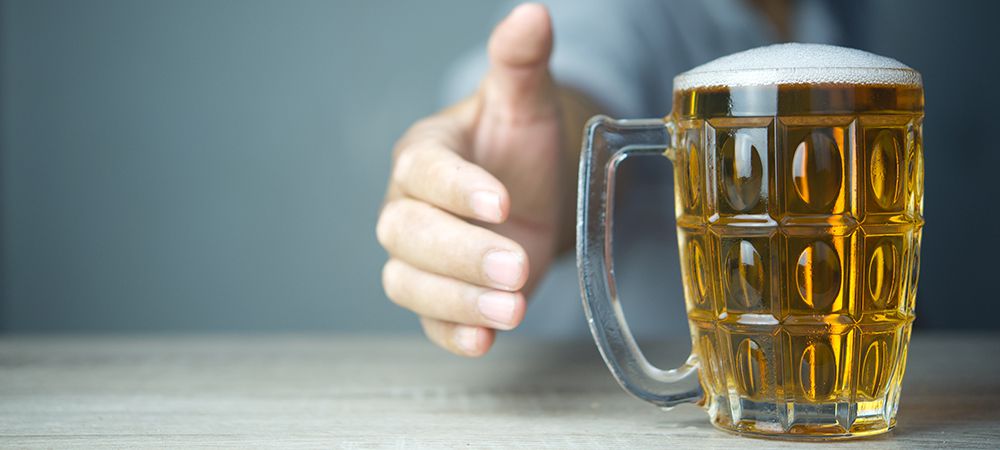
How Quickly Do Alcohol Withdrawal Symptoms Start?
Alcohol addiction is a tragic condition that affects around 4% of the Canadian population. In 2016, almost 7,000 Canadians died as a result of liver disease, cancer, and traffic accidents attributable to alcohol. In addition to the health effects and loss of life, alcohol use disorders can have a significant economic and social cost, resulting in job loss , food insecurity, spousal separation, and the removal of custodial children.
One of the tragedies of alcohol addiction is that it is so difficult to overcome. Many people make unsuccessful attempts to quit drinking before they are finally able to enter into long-term recovery. This is because it does not take long for early withdrawal symptoms to appear. These symptoms are so uncomfortable – and sometimes dangerous – that the individual resorts to having a drink just to make them go away.
As difficult as it may seem when you are in the thick of it, you can quit drinking. The initial challenge is knowing how to get through withdrawal. In this article, we will talk about why withdrawal happens and how soon you can expect to start experiencing symptoms.
Why Do Alcohol Withdrawal Symptoms Happen?
If you regularly overuse alcohol over a sustained period of time, your brain is constantly exposed to its depressant effects. To compensate, it increases production of natural stimulants, such as serotonin and norepinephrine. If you suddenly deprive your brain of alcohol, it becomes flooded with stimulants. The excess results in mental confusion and erratic changes in the way your breathing and circulation are controlled. Harvard Health Publishing likens this to a speeding vehicle abruptly losing its brakes.
What Are The Signs Of Alcohol Withdrawal?
Alcohol Withdrawal Syndrome, or AWS, is a condition affecting people who have developed a physical dependence on alcohol, and then abruptly reduced their alcohol consumption.
What Is Alcohol Dependence?
While most people who consume alcohol are casual recreational drinkers – in other words, they drink moderate amounts of alcohol simply because they enjoy it – there are some who drink in order to achieve the effects that alcohol produces. For example, you might drink because it generates a feeling of confidence, or because it reduces social anxiety.
The problem is that over time, it takes progressively larger amounts of alcohol to achieve these effects, and the more you drink, the more stimulants your brain produces to compensate. This results in a situation where your body needs alcohol in order to function.
A Sudden Reduction In Drinking
The Diagnostic & Statistical Manual of Mental Disorders Edition 5 (DSM-V) stipulates that a condition for diagnosis of AWS is a sudden reduction or cessation of alcohol consumption after having been a heavy drinker for a sustained period of time. This is a fairly subjective criterion: DSM-V does not quantify either the amounts of alcohol consumed or the duration of the heavy drinking.
Additional Diagnostic Criteria
DSM-V lists eight primary alcohol withdrawal symptoms. In order to be diagnosed with AWS, you need to be displaying at least two of these in the absence of other medical causes.
- Anxiety: new onset of anxiety symptoms, or exacerbation of symptoms in people with pre-existing anxiety diagnoses
- Psychomotor agitation: restlessness, inability to sit still, self-stimulating activities like nail-biting and pacing, tapping the hands or feet, irritability or anger, bouts of tearfulness
- Autonomic hyperactivity: arousal of the autonomic nervous system resulting in sweating, rapid heartbeat, dry mouth, lightheadedness, and stomach cramps
- Hand tremors
- Insomnia: difficulty falling or staying asleep, or difficulty going back to sleep after waking up
- Nausea or vomiting
- Hallucinations: may be visual, auditory or tactile
- Tonic-clonic seizures: also known as a grand mal seizure, this results in severe muscle contractions and loss of consciousness
How Soon Do Alcohol Withdrawal Symptoms Start?
Alcohol withdrawal is a process rather than an event. There is a wide variety of withdrawal symptoms, and they appear, peak, and wane at different points of the process.
Initial Withdrawal Symptoms
If you have been drinking significant amounts of alcohol on a regular basis over a period of time, you can typically expect your first withdrawal symptoms to start about eight hours after your last drink. These symptoms include anxiety, insomnia, nausea and stomach cramps.
The initial withdrawal symptoms start as mild discomfort and get progressively more uncomfortable, peaking after around 24 hours. It is during this time that a lot of people with alcohol addictions relapse, preferring alcohol over the withdrawal symptoms.
Stage Two Withdrawal
At around the time your initial withdrawal symptoms are peaking, you may start to experience the next phase of symptoms. These include high blood pressure, rapid heart rate, elevated body temperature, and confusion.
Stage Three – The Danger Zone
2-4 days after your last drink, you may start to experience seizures, hallucinations, fever and agitation. In severe cases, you may experience delirium tremens, a severe withdrawal complication that can be fatal. Symptoms include seizures, disorientation, delirium, panic attacks, hallucinations, extreme shakiness, and loss of consciousness.
Getting Through Alcohol Withdrawal Safely
The withdrawal process generally lasts for 5-7 days, although some of the psychological symptoms may endure beyond that.
Many people feel that they can break their dependence on alcohol simply by quitting drinking. It is not impossible: a lot of people have begun their long-term recovery in this way. It can be dangerous, though, especially if you have been a heavy drinker for a long time.
If you want to quit drinking, follow these tips to ensure your safety and reduce your risk of relapse:
- Book yourself into a detox centre. This will ensure that you have medical attention throughout the most dangerous parts of withdrawal.
- If you are unwilling or unable to go through medical detox, ensure that you are not alone. Get a friend or family member to stay with you.
- Keep your phone charged in case you have to call for medical help, and ensure that emergency services have a way of getting to you.
- If you are using any prescribed medications, write them down along with the dosages. Keep this list nearby or on your person so medical professionals can find it.
- Make a plan for what happens after detox. Your chances of maintaining sobriety are vastly improved if you enter an addiction treatment program.
Getting Help For Alcohol Addiction
At Thousand Islands Rehab Centre, we offer customized addiction treatment programs for people who want a life without alcohol dependence. We recognize and value the uniqueness of all people. No two addiction journeys look the same, so it makes sense that everyone’s recovery will look different. Call us today to learn about our alcohol addiction treatment programs. As a top addiction rehab we will take care of you through detox and rehab, and our aftercare program will ease your transition back into the real world.




